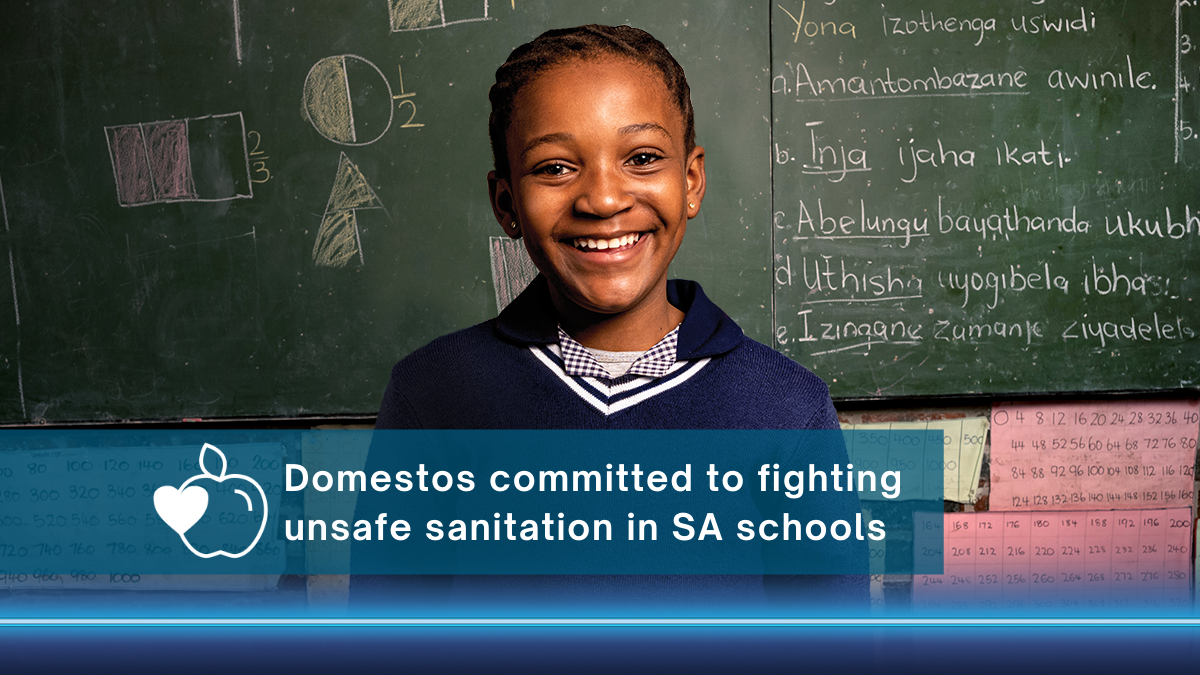World Toilet Day 2021 placed the focus squarely on the global sanitation crisis by raising awareness about the millions of people living without access to safe sanitation facilities. Aligned with the UN Sustainable Development Goal 6, which is to “ensure availability and sustainable management of water and sanitation for all,” the lack of proper sanitation facilities is a scourge that calls for daily focus and attention.
This is a dire concern, with over 2.3 billion people around the world without access to a safe toilet and 1 in 3 schools not having a toilet at all. As much as 66% of schools in developing countries don’t have a usable toilet. This calls for urgent intervention.
The sanitation crisis in South Africa is a dire situation as millions of our learners daily not only face unsafe, poor sanitation at schools, but also have to endure an often dangerous journey to the toilet as well.
Medical doctor, Dr Adé van Heerden, says the physical dangers that our learners face and no running water makes for an exceptionally dangerous visit to the toilet – something we take for granted every day. This is exacerbated by the COVID pandemic as an ideal ground for the spread of the virus and many other diseases, such as Typhoid, Shigellosis, Norovirus, Hepatitis E and Cholera.
Speaking about the psychological impact of poor sanitation on learners, Educational Psychologist and Life Coach, Dr Tshepiso Matentjie, comments that good sanitation is a basic human right that many school children currently do without. This can lead to adverse psychological problems and physical health difficulties, which inadvertently impact the child’s mental health and learning. Where toilets are physically distant or in unsafe environments for learners to reach, or where toilets are few and unhygienic, the tendency is for learners to delay or not use the facilities. In the child’s endeavor to avoid using unsafe and unhygienic toilet facilities, psychological problems such as enuresis and encopresis can develop. These conditions present when the individual loses their ability to control urination or their bowel movements.
To address the sanitation crisis around the world, and indeed South Africa, and work towards the SDG goal 6, efforts need to be quadrupled if we are to meet the UN target of clean water and sanitation for all.
In response to the crisis, Unilever, through its brand Domestos, has been helping to support the realisation of this goal through a comprehensive programme, which includes:
- The National School Hygiene Programme aimed at supporting the curriculum in 15 000 public primary schools across South Africa, by instilling good hygiene and sanitation habits in partnership with the Department of Basic Education.
- The Cleaner Toilets Brighter Future Programme where cleaners, teachers, and the entire school are trained to manage their toilet facilities in a more hygienic and sustainable way, to ensure that high-use facilities retain optimal sanitary levels throughout the day.
- The Infrastructure Programme to fund new toilets or refurbish facilities at the most in need schools around the country.
Since 2010, these programmes have helped over 5 million learners access cleaner and safer toilets, which would not have been possible without partnerships such as the Department of Basic Education, Designdex, Astratto Engineers and Envirosan, to name a few.
To further highlight the impact of poor sanitation in the country, Domestos South Africa brought the stark reality to shoppers at Mall of Africa on World Toilet Day, through a massive display depicting a life-sized toilet in an unsanitary and unsafe condition, similar to what many children are forced to use on a daily basis in schools around the country. This was then juxtaposed with a newly refurbished toilet on a rotating display, with the hard-hitting message that sanitation can significantly impact a child’s schooling experience and that South Africans can make a difference in fighting unsafe sanitation
“The initiative was more than just an activation, but an urgent call-to-action that comes from an understanding of the physical harm that unsafe toilets can pose to learners, including the long-term psychological harm,” says Nobuhle Ngubane, Senior Brand Manager at Unilever. “In some severe cases, children have witnessed, or attend schools where someone has died from falling into a pit latrine, while many others simply grapple with the issue of avoiding the toilet, simply because the conditions are so unbearable.”
“This not only affects their ability to focus in class, but limits their freedom to play happily outside, by suppressing regular bathroom breaks, which can cause harm to the body over the long-term. Furthermore, when children end up soiling themselves, or risk the indignity of relieving themselves outdoors, the embarrassment they suffer can be a very traumatic experience,” says Ngubane.
As it seeks to continue this journey, Domestos is taking consumers along and contributing R1 from every 750ml Domestos bottle, sold between November 2021 to March 2022, towards providing improved sanitation to a further 1 million learners in 2022.
“As much as we are able to contribute towards improving sanitation in schools, we can only win this fight against unsafe sanitation if we work together,” says Ngubane. “Not only do we want to work with all partners in the public and private sector, including suppliers for our infrastructure projects, but we need the dedicated involvement of all South Africans to ensure that unsafe sanitation is eliminated in every aspect of society – from home, to school, and beyond.”



